News

News release: Rape Crisis Scotland calls for radical reform of legal responses to rape
Rape Crisis Scotland call for radical reform as Inspectorate
of Prosecution release report into the prosecution of sexual crime
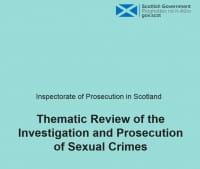
Rape Crisis Scotland have today condemned the ‘unacceptable’ findings of a review into the Investigation and Prosecution of Sexual Crimes released by the Inspectorate of Prosecution in Scotland. Survivors’ voices contained within the report recount the trauma, degradation and humiliation of the court system, with one survivor describing the process as ‘worse than being raped’. Rape Crisis say that the report must act as an urgent wake up call, highlighting the critical need for improvement in legal responses to rape in Scotland.
“I was not prepared.... it was the most degrading and terrifying thing.”
“In our court system, you are totally humiliated. It was the most degrading experience I have been through”.
“Court was absolutely horrendous, it was worse than being raped”.
“Although there was a guilty verdict, I would never go through it again.”
In addition to the overall dissatisfaction from rape complainers highlighted in the quotes above and damning feedback, the report details specific areas of concern. These include:
· Complainers’ cases being allocated to floating trial diets resulting in significant uncertainty;
· Considerable and long delays in the progression of cases, in particular in pre-petition cases;
· Significant and concerning gaps in communication; in one case it took 15 months from the police report for the Crown to contact the complainer;
· Poor standards of communication from the Crown Office and Procurator Fiscal Service in pre-petition cases with almost half of cases being below the standard expected;
· Significant proportions (12%) of sexual offence complainers withdrawing from the process.
Conference on responses to survivors' support & justice needs
Cabinet Secretary for Justice Michael Matheson will open
Rape Crisis
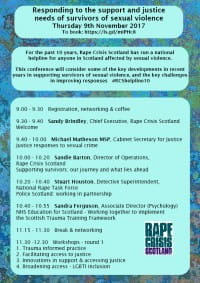 Scotland’s forthcoming conference on ‘Responding to the support and
justice needs of survivors of sexual violence’, which takes place in Glasgow on 9th November.
Scotland’s forthcoming conference on ‘Responding to the support and
justice needs of survivors of sexual violence’, which takes place in Glasgow on 9th November.
The conference, which marks the 10th anniversary of Rape Crisis Scotland’s National Helpline, will include inputs on trauma, the impact of Rape Crisis Scotland’s National Advocacy Project (which supports survivors through the justice process), and will also look at ways in which services can be made more accessible.
National Helpline celebrates 10 years
Today the Rape Crisis National Helpline celebrates 10 years of supporting people affected by sexual violence.
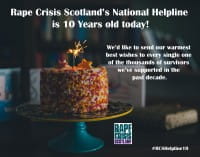
The service was launched and started taking calls on
11th October 2007, and since that time has responded to over
41,000 contacts from people looking for support and information about sexual
violence. Most of these (almost 36,000) were calls, with over 5000 of the
remaining contacts coming in by email. The National Helpline is committed to
providing as accessible a service as possible, and has undertaken a number of
developments in the past 10 years to improve accessibility. The helpline offers
confidential support and information to service users by email as well as over
the phone, and a Deaf access service is available every Tuesday afternoon, with
enhanced access via
online BSL interpreter through Contact Scotland BSL as well as by SMS
text. This service was launched in 2009
and since then all volunteers and staff have undergone deaf awareness training
prior to staffing the helpline.
Rape Crisis Scotland Helpline Anniversary Conference
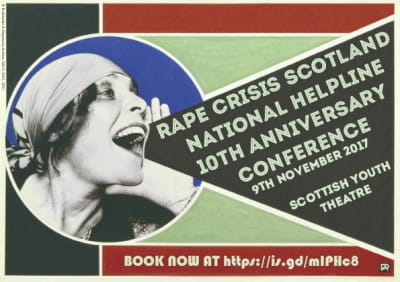
Rape Crisis Scotland’s National Helpline celebrates 10 years of supporting survivors this year and is holding a 10th Anniversary conference on 9th November.
This conference will
look at the developments the helpline has made, how the work has fed into wider
changes in policy and practice, as well as looking to the future.
Key note speakers include:
- Michael Matheson MSP, Cabinet Secretary for Justice
- Sandie Barton, Director of Operations, Rape Crisis Scotland
- Sandra Ferguson, Programme Manager NES Trauma Training Framework Team
- Stuart Houston, Detective Superintendent, National Rape Task Force
- Oona Brooks, Scottish Centre for Crime & Justice Research, University of Glasgow
Vision outlined to improve court experience for children & vulnerable witnesses
As part of Evidence &
Procedure Review, the Scottish Courts & Tribunal Service has today
published a
report which outlines measures which could improve the way children and
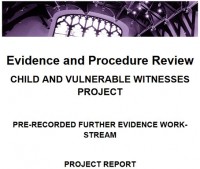
 vulnerable witnesses experience the court process.
vulnerable witnesses experience the court process.
These include encouraging and improving the use of taking evidence by a Commissioner (the current system where a child or vulnerable witness can be questioned in advance of trial, under the supervision of a judge) and changes to legislation to shorten the gap between initial interview and further examination. The report also sets out a long term vision based around the Barnahus (Children’s House) model in place in Scandinavian countries - initially for children, but extended later to other vulnerable witnesses. The Barnahus model spares children from repetitive interviews by different agencies in a variety of locations, which can be harmful and confusing, and can damage the quality of their evidence.
Latest posts
- Rape Crisis Scotland chief executive steps down after 24 years
- Our response to Lord’s Advocate’s letter
- We talk a lot about the rise of rape and sexual violence, let’s talk about how to stop it
- Statement: Supreme Court ruling on Daly v HM Advocate; Keir v HM Advocate
- An open letter: Women against the Far Right Scotland